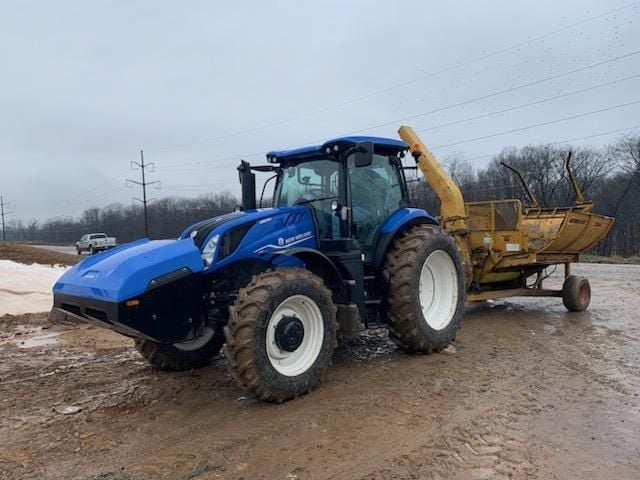A handful of just-arrived New Holland tractors look like all the rest — until you pop the hood.
New Holland is unveiling a methane-powered version of the T6.180 in North America, debuting a technology that is already established in Europe.
The tractor runs on methane from biodigesters or compressed natural gas.
It burns cleaner and runs quieter than its diesel counterpart, but its power — rated at 145 horsepower from a six-cylinder engine — is the same.
The diesel injector has been replaced with gas injectors and spark plugs, and New Holland said the methane model provides a 30% reduction in operating costs compared to a diesel engine.
New Holland Agriculture has extended the Power Command full powershift transmission as an option for the T7.270 Long Wheelbase tractor.
Several hundred New Holland methane tractors are running in Europe, and the machines have many potential applications, said Sean Dorosz, the company’s medium tractor North America product marketing manager.
Any dairy or other farm with a methane digester already has a fuel source. Farms could also get fuel from landfills, where methane is a byproduct, and even airports or municipalities that have access to natural gas.
But methane tractors come with a learning curve with, Dorosz said.
“Most of North America understands compressed natural gas, but most don’t understand what methane is,” Dorosz said. “Methane is a component of compressed natural gas, and once you start explaining that, people get it.”
The only infrastructure needed for the tractor is a compression station, which is the equivalent of a fuel tank and pump for a diesel tractor.
New Holland has been busy taking methane tractors around the country to demonstrations and shows.
Forrester Farm Equipment will have a methane tractor on display at its booth each day of the Pennsylvania Farm Show, and another is on the lot at Rovendale Ag and Barn in Watsontown, Pennsylvania.
Rovendale sales manager Gary Phillips said the tractor has generated a lot of interest from customers at the store.

A methane-powered New Holland T6.180 tractor chops a round bale during a demonstration at the Wayne Township Landfill in Lycoming County.
But with few filling stations available and only 31 methane digesters on farms in Pennsylvania, the market is limited for now.
State and federal grants may help build more filling stations, and New Holland is offering a rebate for the cost of hooking a compressor into gas infrastructure, Phillips said.
He believes such investments will help grow the market for the methane tractor.
“This tractor is the perfect opportunity to capture that methane and use it on the farm and cut down on fuel consumption,” Phillips said. “It’s a small market and there are hurdles, but I think they can be cleared. Just how long that will take is undetermined.”
The methane T6.180 costs 30% more than the diesel counterpart, which has an approximate price of $150,000.
The premium on the methane tractor includes a range extender, which is a tank that mounts on the front of the tractor to increase fuel capacity.
New Holland has been in the alternative fuel market since the 1990s, when it created a prototype hydrogen tractor called the NH2.
The hydrogen fuel cells proved too expensive, and the project was dropped, Dorosz said.
New Holland then turned its attention to methane, largely because of the increasing number of biodigesters on dairy farms.
“The first methane prototype was built in 2010, and we started running it in tests on a dairy farm in Italy,” Dorosz said.
The ML27 and ML27T articulated loaders feature a 50-horsepower engine, heavy-duty drivetrain, an operating weight of 5,732 pounds and a lift capacity of 6,400 pounds.
According to Kelly Burgess, the alternative fuels powertrain research and development manager with New Holland, the purest form of fuel is hydrogen, and methane is close to that.
That’s because methane has fewer carbon atoms than diesel.
The methane tractor produces 98% less particulate matter than a diesel version and a 10% to 15% reduction in carbon dioxide.
“Methane is one of the cleanest fuels you can burn,” Burgess said.
And it can increase self-sufficiency if the farm already has a methane source.
“Anyone that has a natural gas feed in their facility has the capability of operating this tractor. You need the compression station,” Burgess said.
Even farms without a digester that have natural gas infrastructure on location or nearby might be able to use the tractor, said Garin Ingalls, a New Holland livestock and dairy production specialist.
“If a farm has natural gas coming in to heat their shop, we can put a filling station in right at that farm and they can buy their gas back from the grid at a reduction of price,” he said. “You don’t have to have a methane digester to use this tractor.”
The methane T6.180 was recently demonstrated at the Wayne Township Landfill in McElhattan, Pennsylvania, and will be featured at farms, dealerships and shows throughout the year.
The tractors are available for sale from New Holland dealers, and Burgess is optimistic they will catch on in North America.
“Our engineering team in Europe that designed and built this tractor, they said to me this is the best mid-range tractor the Basildon (United Kingdom) plant has ever built,” he said. “It’s the cleanest-operating machine that the Basildon plant has ever built. We need to get the public to see it.”






